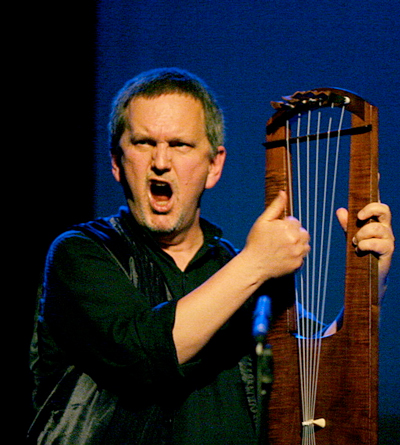by Daniel Hathaway

A pre-concert lecture by Donald Rosenberg traced the influence of the epic poem with its warriors and monsters down to modern times, including its impact on pop culture and superheroes like Batman.
Strumming and plucking a six-stringed harp built for him by Rainer Thurau (based on an instrument dug up in a 7th-century grave in Germany), Bagby sang, declaimed, growled, chanted, whispered, and cooed the tale of Beowulf, the storied warrior who journeyed across the sea to the aid of Hrothgar, King of the Danes. Beowulf proceeded to dispatch the monster Grendel, who had been making nightly raids on the great mead hall Heorot and feasting on the King’s thanes.
Dating from sometime between the sixth and eleventh centuries and originally passed down through oral tradition, the written version of the Beowulf epic survives in a single manuscript made in a monastic scriptorium around 1000 A.D. Bagby, who directs the Paris-based medieval music ensemble Sequentia, has been playing the part of an ancient scop or Anglo-Saxon oral poet for a quarter century. He comes by that role honestly: his biography notes that his forebears emigrated from Jutland to northern England about 630 A.D., then moved on to Virginia some three hundred years later. Bagby discovered Beowulf at the age of 12, beginning a lifelong fascination.
Bagby wasn’t the only one to find the story compelling. J.R.R. Tolkien, the late Oxford philologist and author of The Lord of the Rings, finished a translation of the poem in 1926 (which went unpublished until 2014), and according to his student Humphrey Carpenter, began his lectures on Beowulf in a striking way:
He would come silently into the room, fix the audience with his gaze, and suddenly begin to declaim in a resounding voice the opening lines of the poem in the original Anglo-Saxon, commencing with a great cry of Hwæt! (The first word of this and several other Old English poems), which some undergraduates took to be ‘Quiet!’ It was not so much a recitation as a dramatic performance, an impersonation of an Anglo-Saxon bard in a mead hall, and it impressed generations of students because it brought home to them that Beowulf was not just a set text to be read for the purposes of examination, but a powerful piece of dramatic poetry.
Seated on a stool and illuminated by subtle colored lighting, Benjamin Bagby similarly seized the attention of the capacity audience with his shout of “Hwaet!” (Listen!) With only a few pauses for water, Bagby told the tale straight through. Some 95 minutes later, after Grendel had been slain, his severed arm raised to the roof of the mead hall, and Beowulf and his warriors gifted with treasure, the lights dimmed and the story was done for now (Grendel’s mother would take her revenge on some later occasion).
A projected modern English translation helped the audience keep track of the narrative, although Bagby’s rendering was so compelling that you could take your eyes off the screen for a minute or two and still sense what was happening. The scop even had the crowd laughing out loud at several points in the story.
Even so, by the time an hour had passed and the story was winding down — amid some Christian glosses supplied by its eleventh-century scribe — the pews began to feel a bit hard and the throat a bit dry. However gripping Bagby’s performance was, hearing the poem in a mead hall with a beaker at hand seemed like a fine idea.
Published on ClevelandClassical.com November 17, 2015.
Click here for a printable copy of this article


